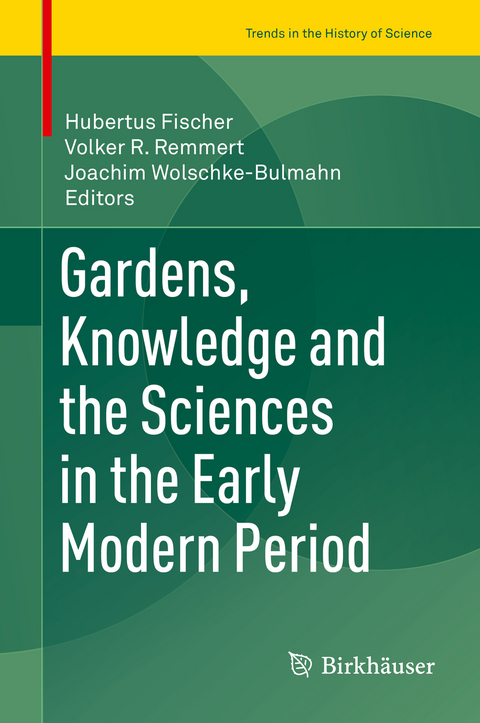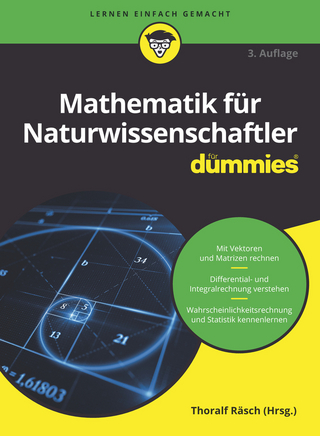
Gardens, Knowledge and the Sciences in the Early Modern Period
Springer International Publishing (Verlag)
978-3-319-26340-3 (ISBN)
This volume focuses on the outstanding contributions made by botany and the mathematical sciences to the genesis and development of early modern garden art and garden culture. The many facets of the mathematical sciences and botany point to the increasingly "scientific" approach that was being adopted in and applied to garden art and garden culture in the early modern period. This development was deeply embedded in the philosophical, religious, political, cultural and social contexts, running parallel to the beginning of processes of scientization so characteristic for modern European history. This volume strikingly shows how these various developments are intertwined in gardens for various purposes.
1.Hubertus Fischer, Volker R. Remmert, Joachim Wolschke-Bulmahn: Introduction.- I Scientization and Knowledge about Nature.- 2.Volker R. Remmert: The Art of Garden and Landscape Design and the Mathematical Sciences in the Early Modern Period.- 3.Michael Leslie: "Without design, or Fate, or Force": Why Couldn't John Evelyn Complete the "Elysium Britannicum"?.- 4.Chandra Mukerji: The Power of the Sun-King at the Potager du Roi.- II Mathematical Sciences and the Art of Gardening.- 5.Simone M. Kaiser and Matteo Valleriani: The Organ of the Villa d'Este in Tivoli and the Standards of Pneumatic Engineering in the Renaissance.- 6.Denis Ribouillault: Sundials on the Quirinal: Astronomy and the Early Modern Garden.- 7.Anthony Gerbino: Jacques Lemercier's 'Scenografia du Chasteau de Montjeu': Printmaking, Cartography, and Landscape in 1620.- 8.Hubertus Fischer: Utopia, Science and Garden Art in the Early Modern Era.- III Botany between Art and Science.- 9.Alessandro Tosi: Botanical illustration and the idea of the garden in the sixteenth century between imitation and imagination.- 10.Irina Schmiedel: Gardens on Canvas and Paper: Cataloguing Botanical Abundance in Late Medici Tuscany.- 11.Gregory Grämiger: Reconstructing Order: The Spatial Arrangements of Plants in the Hortus Botanicus of Leiden University in its First Years.- 12.Carola Piepenbring-Thomas: Garden visits, observations, reading and excerpts. Martin Fogel (1634-1675) and his techniques of acquiring knowledge.- IV Botanical Knowledge and Horticulture.- 13.Anatole Tchikine: Watering the Renaissance Garden: Horticultural Theory and Irrigation Practice in Sixteenth-Century Tuscany.- 14.Alette Fleischer: Gardening nature, gardening knowledge: The parallel activities of stabilizing knowledge and gardens in the early modern period.- 15.Ana Duarte Rodriguez: Gardening knowledge through the circulation of agricultural treatises in Portugal from the sixteenth to eighteenth centuries.- 16.Iris Lauterbach: Commerce and Erudition: Civic Self Representation by Botany and Horticulture in Germany, 16th to 18th centuries.- V Perspective.- 17.Joachim Wolschke-Bulmahn: Landscape Design and the Natural Sciences in Germany and the United States in the Early Twentieth Century: "Reactionary Modernism"?.- Index of names.
"Gardens have increasingly become the focus of scholarly attention. ... This stimulating volume is one of the latest, most relevant contributions. ... While describing garden and landscape design in relation to theoretical knowledge, horticulture, botany, and mathematics, this timely volume successfully addresses how much garden knowledge shaped early modern culture, sciences, and philosophy. Ultimately, the volume engagingly contributes to the inclusion of gardens in the scientific revolution of early modernity." (Fabrizio Baldassarri, ISIS, Vol. 108 (4), December, 2017)
“Gardens have increasingly become the focus of scholarly attention. … This stimulating volume is one of the latest, most relevant contributions. … While describing garden and landscape design in relation to theoretical knowledge, horticulture, botany, and mathematics, this timely volume successfully addresses how much garden knowledge shaped early modern culture, sciences, and philosophy. Ultimately, the volume engagingly contributes to the inclusion of gardens in the scientific revolution of early modernity.” (Fabrizio Baldassarri, ISIS, Vol. 108 (4), December, 2017)
| Erscheinungsdatum | 04.05.2016 |
|---|---|
| Reihe/Serie | Trends in the History of Science |
| Zusatzinfo | VI, 374 p. 107 illus., 35 illus. in color. |
| Verlagsort | Cham |
| Sprache | englisch |
| Maße | 155 x 235 mm |
| Gewicht | 726 g |
| Themenwelt | Mathematik / Informatik ► Mathematik ► Allgemeines / Lexika |
| Mathematik / Informatik ► Mathematik ► Geschichte der Mathematik | |
| Schlagworte | history of botany • history of early modern science and technology • history of landscape design • History of mathematical sciences • history of the mathematical sciences • mathematics and statistics • scientization and mathematization • transmission of knowledge |
| ISBN-10 | 3-319-26340-4 / 3319263404 |
| ISBN-13 | 978-3-319-26340-3 / 9783319263403 |
| Zustand | Neuware |
| Haben Sie eine Frage zum Produkt? |
aus dem Bereich


